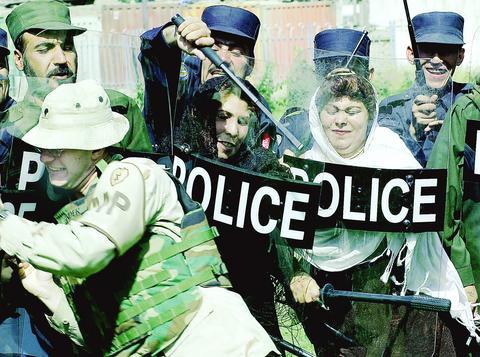The burly nomad with a henna beard and a fierce scowl grips the pen between his thick fingers. Turgul cannot read the election material around him, but is determined to practice the first vote of his life.
The turbaned tribesman drags the pen across a scrap of paper. "Just like that," he says uncertainly, holding aloft the squiggle that will mark his choice.

PHOTO: AFP
Few elections have faced such a dizzy array of challenges as Saturday's presidential poll in Afghanistan. Taliban terrorists are threatening bombings and warlords may try to warp the result. The terrain is forbidding, the logistics maddening and, like Turgul, many voters are illiterate.
"It's been very difficult," said Amandine Roche, a UN civil education officer. "But Afghans really want this to work."
More than 10 million voters have registered, 40 percent of them women; there is an ethnically diverse field of 18 candidates; and for the first time ever, war-worn Afghans will taste democracy.
There is also anxiety. In the south and south-east, the Taliban have threatened to scuttle the poll through violence and intimidation. Afghan and coalition forces on Saturday arrested 25 Taliban suspects in a dawn raid in Kabul.
Away from the capital, the main worry is the warlords who, between them, have 45,000 gunmen in their pay. Flush with soaring drug revenues, many vow to retain influence over their fiefdoms.
"Many rural voters say the militias have told them how to vote, and they're afraid of disobeying," said Brad Adams of Human Rights Watch.
The UN, which is spending US$200 million on the election, has 115,000 election officials and has hired 5,000 satellite phones, 1,150 jeeps, four helicopters and a cargo jet. The final vote will not be tallied until the last ballot box returns from the farthest reaches of the Hindu Kush mountains by donkey, up to two weeks after polling day.
Yet Afghans display an infectious enthusiasm about the poll. Yesterday Kuchi nomads gathered outside their tents on a hillside near Kabul for a lesson in voting.
Shah Faqir, a one-eyed sheep farmer, was unable to read but could point to the photograph of his chosen candidate, Hamid Karzai, the country's interim leader. "He stopped the fighting and brought stability to this country," he said. "The others are bad guys. If they win, the gunmen will return and the country will be destroyed."
The Kuchi women have also registered to vote, but were nowhere to be seen.
Karzai is the favorite but may face a second round of voting if his nearest rival, the former Education Minister Yunus Qanooni, polls strongly. Both are flag-bearers for their ethnic communities: Qanooni is a northern Tajik, Karzai a southern Pashtun but with broader appeal.
Some say an election now is too dangerous. But "most Afghans see it as a move away from the rule of the gun, and that is positive," said Grant Kippen of the US National Democratic Institute, which helps to oversee elections.

A fire caused by a burst gas pipe yesterday spread to several homes and sent a fireball soaring into the sky outside Malaysia’s largest city, injuring more than 100 people. The towering inferno near a gas station in Putra Heights outside Kuala Lumpur was visible for kilometers and lasted for several hours. It happened during a public holiday as Muslims, who are the majority in Malaysia, celebrate the second day of Eid al-Fitr. National oil company Petronas said the fire started at one of its gas pipelines at 8:10am and the affected pipeline was later isolated. Disaster management officials said shutting the

US Vice President J.D. Vance on Friday accused Denmark of not having done enough to protect Greenland, when he visited the strategically placed and resource-rich Danish territory coveted by US President Donald Trump. Vance made his comment during a trip to the Pituffik Space Base in northwestern Greenland, a visit viewed by Copenhagen and Nuuk as a provocation. “Our message to Denmark is very simple: You have not done a good job by the people of Greenland,” Vance told a news conference. “You have under-invested in the people of Greenland, and you have under-invested in the security architecture of this

UNREST: The authorities in Turkey arrested 13 Turkish journalists in five days, deported a BBC correspondent and on Thursday arrested a reporter from Sweden Waving flags and chanting slogans, many hundreds of thousands of anti-government demonstrators on Saturday rallied in Istanbul, Turkey, in defence of democracy after the arrest of Istanbul Mayor Ekrem Imamoglu which sparked Turkey’s worst street unrest in more than a decade. Under a cloudless blue sky, vast crowds gathered in Maltepe on the Asian side of Turkey’s biggest city on the eve of the Eid al-Fitr celebration which started yesterday, marking the end of Ramadan. Ozgur Ozel, chairman of the main opposition Republican People’s Party (CHP), which organized the rally, said there were 2.2 million people in the crowd, but

JOINT EFFORTS: The three countries have been strengthening an alliance and pressing efforts to bolster deterrence against Beijing’s assertiveness in the South China Sea The US, Japan and the Philippines on Friday staged joint naval drills to boost crisis readiness off a disputed South China Sea shoal as a Chinese military ship kept watch from a distance. The Chinese frigate attempted to get closer to the waters, where the warships and aircraft from the three allied countries were undertaking maneuvers off the Scarborough Shoal — also known as Huangyan Island (黃岩島) and claimed by Taiwan and China — in an unsettling moment but it was warned by a Philippine frigate by radio and kept away. “There was a time when they attempted to maneuver